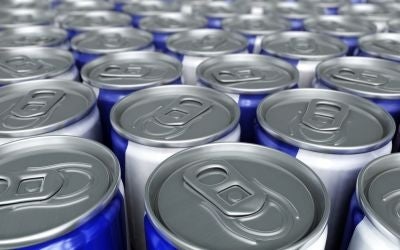Your support helps us to tell the story
From reproductive rights to climate change to Big Tech, The Independent is on the ground when the story is developing. Whether it's investigating the financials of Elon Musk's pro-Trump PAC or producing our latest documentary, 'The A Word', which shines a light on the American women fighting for reproductive rights, we know how important it is to parse out the facts from the messaging.
At such a critical moment in US history, we need reporters on the ground. Your donation allows us to keep sending journalists to speak to both sides of the story.
The Independent is trusted by Americans across the entire political spectrum. And unlike many other quality news outlets, we choose not to lock Americans out of our reporting and analysis with paywalls. We believe quality journalism should be available to everyone, paid for by those who can afford it.
Your support makes all the difference.Frequent consumption of energy drinks has been linked to alcohol-related problems, binge drinking and prescription drug abuse among a very specific group of users - musicians, says a group of US researchers.
In a survey examining substance use among 226 New York professional and amateur musicians aged 18-45, researchers found that of the 94 percent of respondents who said they were caffeine users, 57 percent said they sought caffeine jolts from energy drinks specifically.
The study was published in the Journal of Caffeine Research and released from the University of Buffalo last week.
In the study, those who used energy drinks reported significantly more misuse of legal substances than those who didn't drink energy drinks: 31 percent of energy drink users misused prescription drugs compared to 13 percent of nonusers while 76 percent reported binge drinking compared to 59 percent of nonusers.
Researchers also found that 68 percent of musicians reported heavy drinking at least once or twice a year and 74 reported experiencing at least one alcohol-related social problem, defined as a hangover, arguing with others about their drinking, or doing something under the influence that they later regretted.
Musicians also reported recreational drug use: 52 percent said they used marijuana, 25 percent used psychedelic drugs, 23 percent abused prescription drugs and 21 percent said they used cocaine.
Musicians constitute "an especially fertile demographic for energy drinks," explains co-author Kathleen E. Miller, given their lifestyle - late or irregular hours and sleep deprivation.
Researchers point out that marketing campaigns often evoke music in their names, sponsor music tours and incorporate music-related logos in their brands in order to target this niche market.
Underlying messages also carry themes like rebellion, risk taking and illegal drug use, points out co-author Kathleen E. Miller, giving energy drinks a special appeal for musicians "who tend to score high on the personality trait of sensation-seeking."
This spring, American rapper Snoop Dogg's alcoholic energy drink, Blast by Colt 45, for instance, was slammed by 15 US states as a "binge in a can" that glamorized heavy drinking and targeted underage Americans. The 23.5-ounce (700 ml) can has 12 percent alcohol - equivalent to an entire six-pack of American beer.
Rockstar is the second most popular energy drink in the US, after Red Bull, and is targeted "for those who lead active and exhausting lifestyles - from athletes to rock stars," their website says.
Other music-inspired brands include Loud Energy Drink, Rock On, and Pimp Juice, the latter of which is owned by rapper Nelly.
In another study due to be published in the July issue of Alcoholism: Clinical & Experimental Research, researchers discovered that energy drinks mixed with alcohol contributed to higher impulsivity and stimulation in the drinker than drinking alcohol alone. The result can lead to engaging in riskier behavior.
To learn more, visit http://www.buffalo.edu/news/12651.

Join our commenting forum
Join thought-provoking conversations, follow other Independent readers and see their replies
Comments